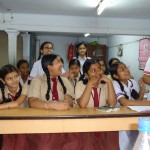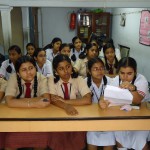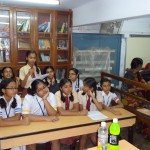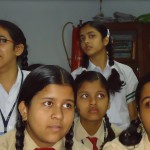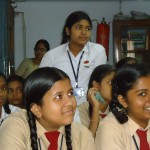Being a student of literature for the longest period of time, the idea of facilitating the PeaceWorks Literature Curriculum (PWSC) in National High School was thrilling. Could I initiate a series of discussions on identity, gender and human rights with the help of literary pieces? I wondered. I was nervous as I hadn’t done this before. So I surprised my colleague, Megha, with incongruous questions at odd moments—‘So when do I begin?’—Interrupting her while she was still talking, a half finished sentence dangling mid air! Once, in the middle of lunch, ‘So what can I expect from it?’ And with shameless inanity— ‘how am I supposed to conduct the sessions?’ Experiences of those who had conducted sessions before me were shared with me. And, I had a fantastic pool of relevant literature at my disposal. But the challenge was at a different level—a personal level. I had two questions dangling treacherously above my head—will I get through to them in an interesting way? And, will they understand the pieces?
Like vignettes of Elias Canetti, most of these pieces were profound literary gems, and it was this very profundity that made me uneasy. These are school students barely in their teens! I worried. But it was a private misgiving. I shoved it under the proverbial carpet.
However the sessions gave me two important answers (rather lessons, if I may) — I should neither underestimate others nor myself. The young students were not only sharp and forthcoming but they made me feel at home, wanted and incredibly loved. I could instantly connect with them. And reading those pieces with them was a treat, as now, I could discuss my ideas with these young students, who, refreshingly, were not trapped by annoying theoretical jargon. We shared ideas, and what a diverse range of ideas they had, and how dynamic were our discussions! It was uplifting.
I saw them through the process of de-schooling. I participated with them when they debated and contemplated. The age-old ideas of gender stereotypes, narrow national identification and a general droopiness about rights came to the fore. Some were eloquent with words others with gestures. I learnt the art of egging on the silent ones to speak their minds. It was such a wonderful feeling when I saw their faces light up with joy on being able to articulate themselves, have their thoughts heard and most importantly, have their points of view respected. Trust and easy affability helped me introduce ideas that were new to them. Sometimes they were also prejudiced against some of these ideas.
The discussion on identity and difference evoked such a burst of interest that I was amazed. Very carefully one had to remove the chaff of hostile rhetoric from the grain—the idea of accepting and living with difference. It was encouraging to see that these youngsters could challenge their own prejudices and allow new ideas to sink in. I was thinking aloud with them— I was learning to recognize my prejudices and face them more critically. In giving I was taking—taking so much more.
A report by Shailza Rai

